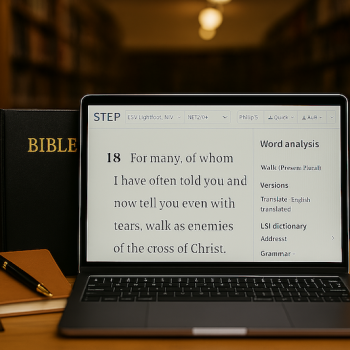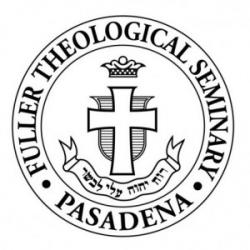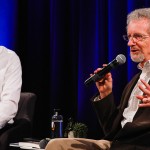Brueggemann’s Theology of the Old Testament, Part 3. Part of a series preparing for Brueggemann’s lectures at Fuller Seminary at the end of April.
By Reed Metcalf
O give thanks to the Lord, for he is good,
for his steadfast love endures forever!
Psalm 136 is a beautiful piece of poetry, a bold statement of faith, and a retelling of the mighty deeds of God in the history of Israel. It (or at least parts of it) has been adapted to a vast amount of contemporary worship songs. This psalm and the songs it has inspired can be powerful testaments of God’s faithfulness and power to save.
But if we’re honest, this psalm doesn’t always match reality. We don’t always feel like singing it. There are times where we question whether or not God’s love truly does endure forever. Fortunately for us, Israel asked the same questions.
Last week, we explored how Israel spoke of God’s deeds and came to know God’s loving and yet untamable character. Israel testified to this God in their Scriptures—in our Scriptures—and gave us a God who was both in solidarity with Israel and sovereignly untied to anyone or anything. Yet there was an understanding that God worked in history in mighty ways to bring about justice in the world.
But Israel sometimes could not sing in praise of Yahweh, because sometimes it seemed that God was not present, was not saving, was not who he said he was.
Brueggemann calls this admission of Israel its “countertestimony;” if Israel’s “testimony” is that God is active in the world to save, to bring justice, and to reveal his holiness, Israel’s countertestimony is that it appears often that God is hidden, unfaithful, and uncaring. What is interesting about this countertestimony is that it is not coming from some outside, modern source who tried to put God in a test-tube and didn’t find conclusive evidence. Instead, as Brueggemann says, the countertestimony comes from within Israel itself and is a crucial part of its witness to God (317).
For many, this sort of talk of God may feel rebellious, unfaithful, or sacrilegious. How dare we ask this, we might wonder. Fortunately, Job, the Psalms, Proverbs, and, of course, Ecclesiastes ask these questions first. They let these questions—often which are unanswered—become part of our witness. They let us ask. In these biblical books, we find permission to ask God, “Where are you?”

We need these questions, because we often find life to be past our ability to bear, and we need to know that we are allowed to feel our heartache for what it is, instead of covering it up with “but his love endures forever!” The faith that insists that everything is always alright is shallow, hollow, and brittle. The faith that is honest says, “God, I don’t feel your love and I don’t see your love. Where are you?” A faith that asks honest questions might receive honest answers.
For those who wonder exactly what I am talking about, let me give a concrete example. A classmate of mine recently lost a nephew. A healthy infant, here one day and gone the next from acute and untreatable illness. There are no words that can convey that grief, let alone make things right. No anecdotes, no platitudes will suffice. Where is God in that situation? Where is his “steadfast love” I hear so much about?
“You said you came to make all things right, God. Why can’t you make this right?”
“Where are you?”
Israel asks this question time and again. It is a question that stands in tension with the witness to the God who split the Red Sea, the God who sent manna, the God who restored his people from exile. We never really get an answer, though there are hints that we can simply never know the inexhaustible mind of God. Our own answers to these tough questions—“God needed another angel in heaven” or “God has a reason for this”—are often completely unscriptural tripe, insensitive to others’ pain at best and abusive at worst. But God’s answer doesn’t really show up either.
But we are allowed to ask the question.
Brueggemann suggests that this is part of the vastness of God (400-403). We see and testify to God’s acts of mercy and grace, but sometimes God is neither merciful nor graceful. He is God, untamable and uncontainable, and our questions of his sometimes-absence stand in tension with our witness to his sometimes-presence. We are, as Brueggemann points out, currently living in the Saturday between Good Friday and Easter Sunday. We live in a place of uncertainty, of pain, of confusion. We were told that things would be different, and though we hope and trust that God will someday make things right, we can’t help but feel the very real pain that this life brings. We live in the tension, and hold our breath with expectation.
Next week will cover the third section of Theology of the Old Testament. To register for the Fuller Forum, click here.
Reed Metcalf works as a Media Relations and Communications Specialist at Fuller Theological Seminary. He writes for and curates the Fuller Blog and contributes regularly to FULLER magazine. He graduated with his MDiv from Fuller in 2014 and co-founded the Fuller Faith and Science student group. Reed and his wife Monica live in Pasadena, CA, where he is an ordination candidate in the Free Methodist church. Follow him on Twitter at @reedmetcalf.
Follow Fuller Seminary on Twitter at @fullerseminary.















